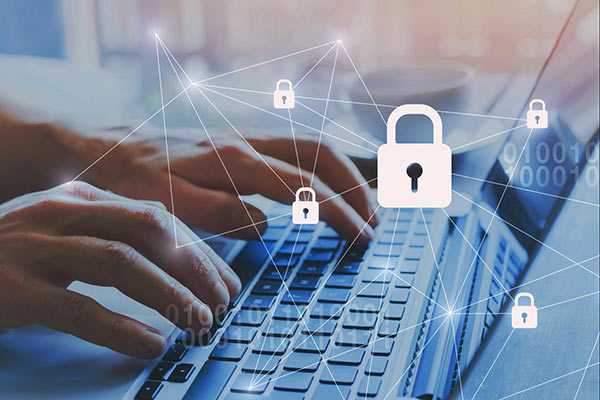“What is internet privacy and how can I keep myself safe?” We are glad you asked! This article teaches you simple, yet important techniques and features to be aware of for your personal online safety.
Maybe you have wondered how to protect yourself on the internet for a while. Question no more—let’s discuss everything you need to know about how to protect yourself online.
First, let’s look at antivirus software and why it’s essential for protecting against internet privacy issues.

Antivirus Software Protection
If you want to protect your computer or your phone against malware, damages, or fraudulent activity, you will want to install antivirus software.
Antivirus software works to identify weak spots in your computer security where hackers will tend to target. Once the software identifies those weak spots, it will then strengthen them against attacks.
If you want to ensure your private information stored on your computer or electronic device remains inaccessible to an outside party, then you need to purchase antivirus software.
The top 3 antivirus software choices for 2019 include:
- McAfee
- Panda
- Bullguard
While Antivirus software is important, let’s look at another protection technique for internet privacy issues.
Updated Cookies
Cookies! Are you feeling hungry? Internet cookies are little files dropped onto your computer by websites that want to monitor your online activity.
These websites want to use your browsing history to know what product ads to put in front of you.
Cookies store your data that can be accessed by websites or sold by those sites to third parties. While cookies aren’t necessarily a bad thing, you need to keep them in mind when putting personal information on the internet.
It’s a good idea to check your settings and make sure your device alerts you to a cookie when it’s installed.
While cookies are important, your GPS setting is another way of protecting yourself online. Let’s take a look!
Proper GPS Settings
One key to maintaining personal privacy while online is to turn off your cellular GPS tracking. When your GPS tracking is turned on, this means all of your (hundreds of) applications on your phone can track your location.
Do you want to know something really scary? Some of those applications are social media apps that post your location online. Why would anyone want strangers to know where they are?
Do you like knowing you are being tracked everywhere you go? By turning off your GPS location in your phone settings, you are not only protecting your personal safety but also that of your house. Your unattended home isn’t left vulnerable to break-ins.
While GPS tracking can be used for good—like knowing where your child is—you don’t personally want to be geotagged, so just turn off your GPS tracking. Let’s check out another way to protect your privacy with autofill features.
Auto Fill Deactivation
Okay, so we now know that autofill is extremely convenient when filling out information online, but it may be best to turn it off for the sake of your online protection.
We know, We know—it saves you so much time and tedious type-work, but trust us—your safety is worth the extra bit of effort!
Autofill is a feature that recognizes when you type in the first couple numbers of your house address and then offers the option of filling in the rest of your personal home address and phone number information.
This feature is dangerous because it leaves your personal information vulnerable to a data breach by hackers, fraudsters, and criminals who will then take and use this information to cause you harm.
The solution to stop this from ever happening is to just turn off your autofill in your settings.
Now that we’ve discussed autofill, let’s look at ways to keep your internet browsing safe.
While you’re at it, check out https://setapp.com/how-to/delete-recent-searches to learn more about how to delete your past searches.
Private Browsing Modes
If you want to stay anonymous online and immune to internet cookies, then private browsing mode options are the way to go.
Some websites offer features of private browsing that allow you to surf the web on modes that filter out cookies or pop-up ads. These private modes protect your browsing history and personal information.
Here are several examples of private browsing modes you can use:
- Incognito—Google Chrome’s little icon (hat and glasses)
- TOR
- DuckDuckGo
Now that we’ve looked at several private browsing modes, let’s check out another cool protection measure: VPNs.
VPN and Encryption
VPNs work better than generic private browsing modes. VPNs connect you to the internet through another server. Your connection is encrypted, which is a strong way to protect your information.
Criminals and spammers are unable to access your information as easily with a VPN because the tunnel (encrypted connection) you are using makes it nearly impossible for them to obtain your personal, stored data.
When using a VPN, the provider hides your IP address and gives you a new one once you connect to a server. Websites are unable to track your browsing history and location since they don’t know your actual IP address.
While it may be hard to choose from the myriad of VPNs out there, we have compiled a shortlist of the best VPNs in 2020.
- ExpressVPN
- NordVPN
- Surfshark
- CyberGhost VPN
Now that we’ve talked about the importance of encryption through VPNs, let’s look at how to protect yourself online with the abundance of social media.
How to Protect Yourself on the Internet With Social Media
Social media is a platform that gives fraudsters easy access to gathering personal information on you and stealing your identity.
The default settings on social media platforms are set as “public” display so that anyone can view and access your posted information. It is essential to change these settings to “private” on each of your social media accounts.
Unfortunately, Facebook is an application where users do not fully control their privacy anymore. It profits off of selling data from each of its users.
By posting sensitive information like phone numbers or emails on Facebook, other parties have access to this information and use it to promote their products or services. These companies can directly contact you, then, soliciting their product.
You just want to make sure your privacy settings are as strict as possible, not just on Facebook, but on all other social media accounts.
Staying Safe
Brainstorming about how to protect yourself on the internet is important. Taking action, however, is essential to your personal safety as well as ensuring your home and family stay safe.
Check out our blog for more tips and information!





